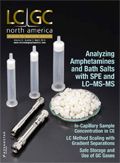Peaks of Interest
Daniel W. Armstrong, a professor of chemistry and biochemistry at the University of Texas Arlington in Arlington, Texas, is to receive the 2014 American Chemical Society Award in Separations Science and Technology.
Daniel W. Armstrong to Receive ACS Award in Separation Science and Technology 2014
Daniel W. Armstrong, a professor of chemistry and biochemistry at the University of Texas Arlington in Arlington, Texas, is to receive the 2014 American Chemical Society Award in Separations Science and Technology. This is the second time this year that the ACS has recognized the work of Armstrong — in August last year he was selected to join the ACS Class of Fellows 2013.
The award, sponsored by Waters Corporation, recognizes "the development of novel applications with major impacts and/or the practical implementations of modern advancements in the field of separation science and technology." It will be presented to Armstrong on March 17 at the ACS national conference in Dallas, Texas.
Armstrong is thought of as a leader in his field and is considered to be the "father" of pseudo-phase separations — a type of chromatography that lowers costs, volatility, and toxicity while providing higher selectivity than other analytical methods. His commercialized innovations are applied across the drug development, environmental analysis, and petrochemical industries.
In his career, Armstrong has developed more than 30 different chromatography columns — a gas chromatography column that he developed is now part of the Rosetta mission of the European Space Agency exploring the composition of comets in space.
Purdue Research Foundation Invests in Two Start-up Companies
The Purdue Research Foundation (West Lafayette, Indiana) has awarded $150,000 in investment to two companies that have licensed Purdue University Innovations: Telos Discovery Systems Inc., and bioVidria Inc. The investment is from the Emerging Innovations Fund, which was set up in 2008 to accelerate the commercialization of early stage technologies in the Purdue community.
The company bioVidria Inc., received $75,000. It is based on the work of Mary J. Wirth, the W. Brooks Fortune Distinguished Professor of Analytical Chemistry in the Department of Chemistry. The company focuses on developing new materials for chromatography, specifically protein analysis, for the pharmaceutical and agricultural industries.
Telos Discovery Systems Inc., also received $75,000. The company is a boutique equipment manufacturer that supports basic and discovery medical research. The company is based on the work of Joseph Garner, a former Purdue associate professor in the Department of Animal Sciences.
Elizabeth Hart-Wells, assistant vice president and director of the Purdue Office of Technology Commercialization said: "The fund makes seed investments and early-stage investments in the form of convertible debt and/or warrants, with a goal of accelerating the commercialization of early-stage innovations."

New TRC Facility Accelerates Innovation and Delivery
April 25th 2025We’ve expanded our capabilities with a state-of-the-art, 200,000 sq ft TRC facility in Toronto, completed in 2024 and staffed by over 100 PhD- and MSc-level scientists. This investment enables the development of more innovative compounds, a broader catalogue and custom offering, and streamlined operations for faster delivery. • Our extensive range of over 100,000 high-quality research chemicals—including APIs, metabolites, and impurities in both native and stable isotope-labelled forms—provides essential tools for uncovering molecular disease mechanisms and exploring new opportunities for therapeutic intervention.
New Guide: Characterising Impurity Standards – What Defines “Good Enough?”
April 25th 2025Impurity reference standards (IRSs) are essential for accurately identifying and quantifying impurities in pharmaceutical development and manufacturing. Yet, with limited regulatory guidance on how much characterisation is truly required for different applications, selecting the right standard can be challenging. To help, LGC has developed a new interactive multimedia guide, packed with expert insights to support your decision-making and give you greater confidence when choosing the right IRS for your specific needs.

.png&w=3840&q=75)

.png&w=3840&q=75)



.png&w=3840&q=75)



.png&w=3840&q=75)










